Animals
Widening our circle of compassion
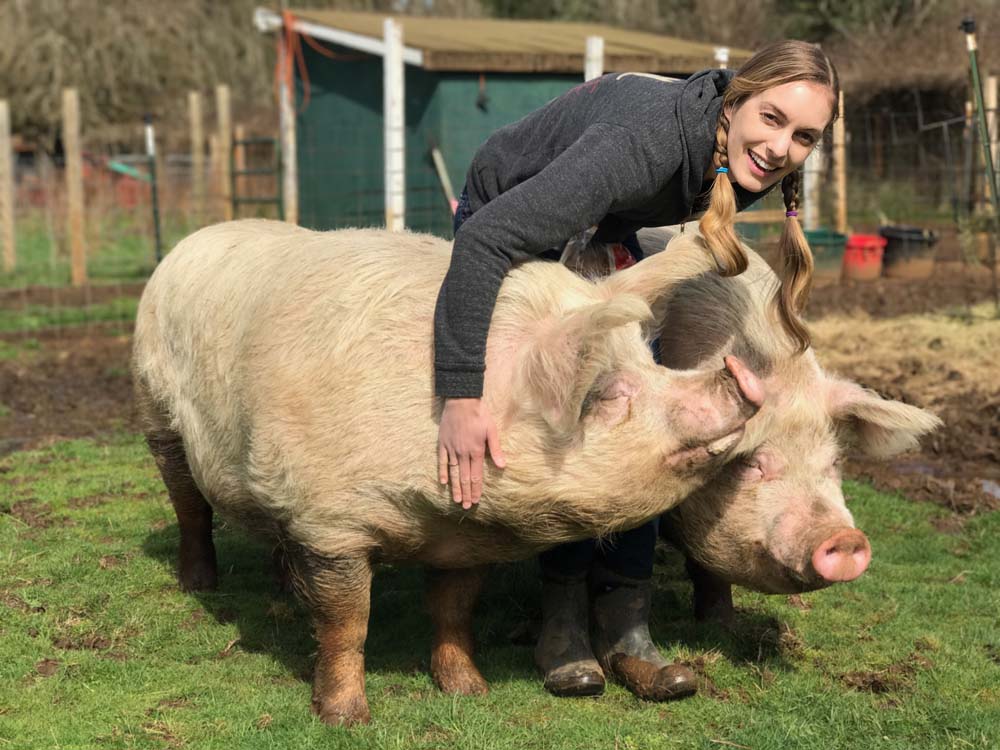
Barbie and Skipper with Dianne, OUT TO PASTURE ANIMAL SANCTUARY
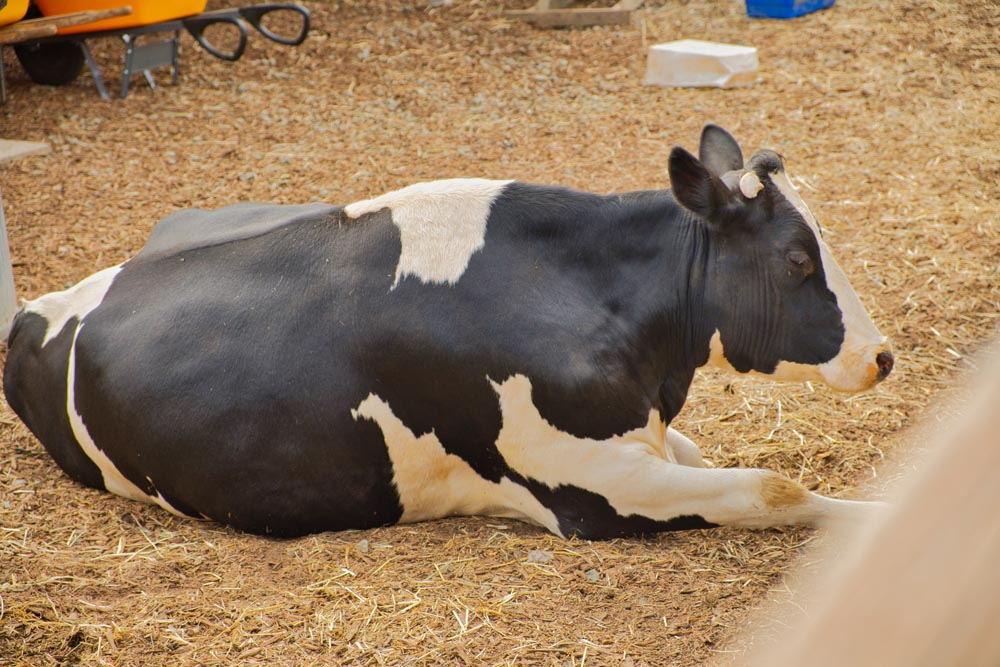
Erica, RANCHO COMPASION
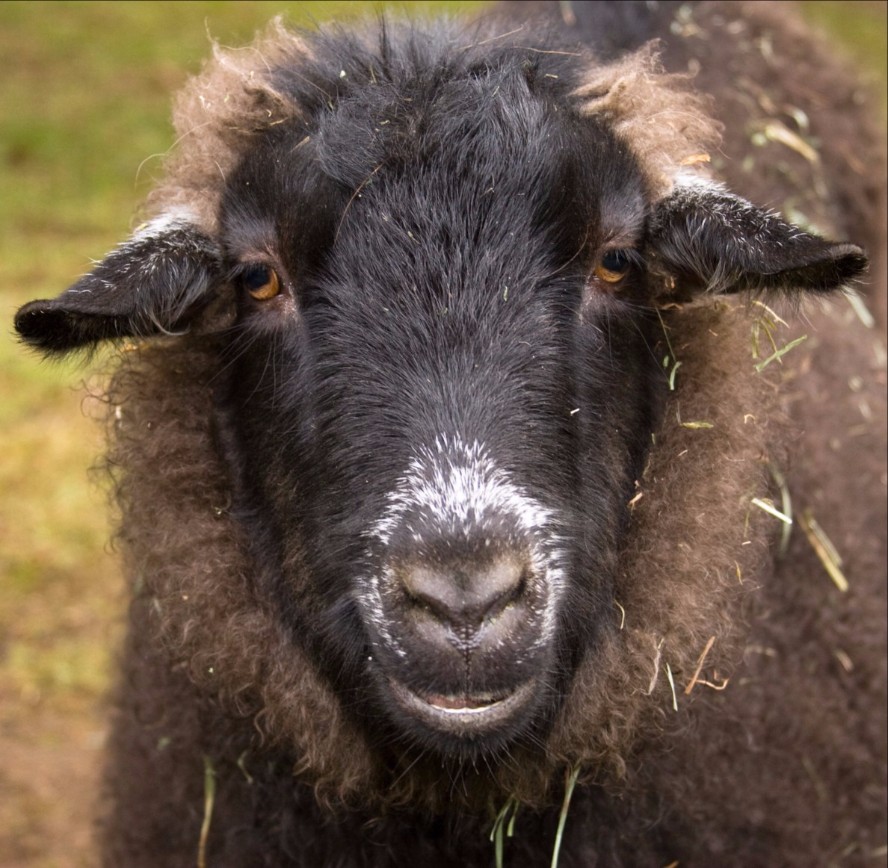
Sparky, ONE HEART WILD EDUCATION SANCTUARY
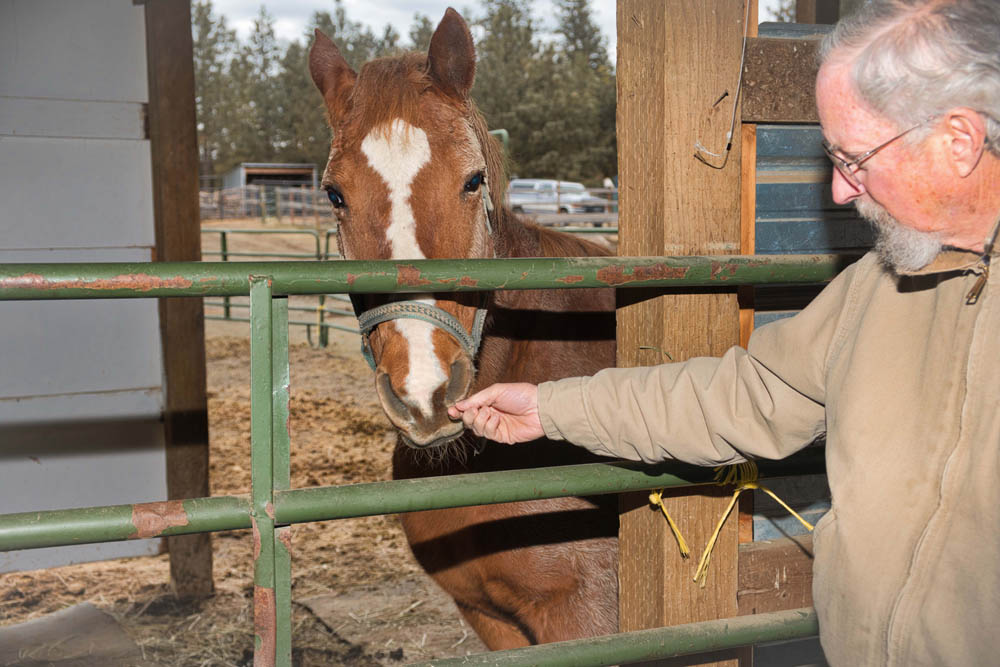
Nutmeg with Pete Jagoda, RIVER’S WISH ANIMAL SANCTUARY
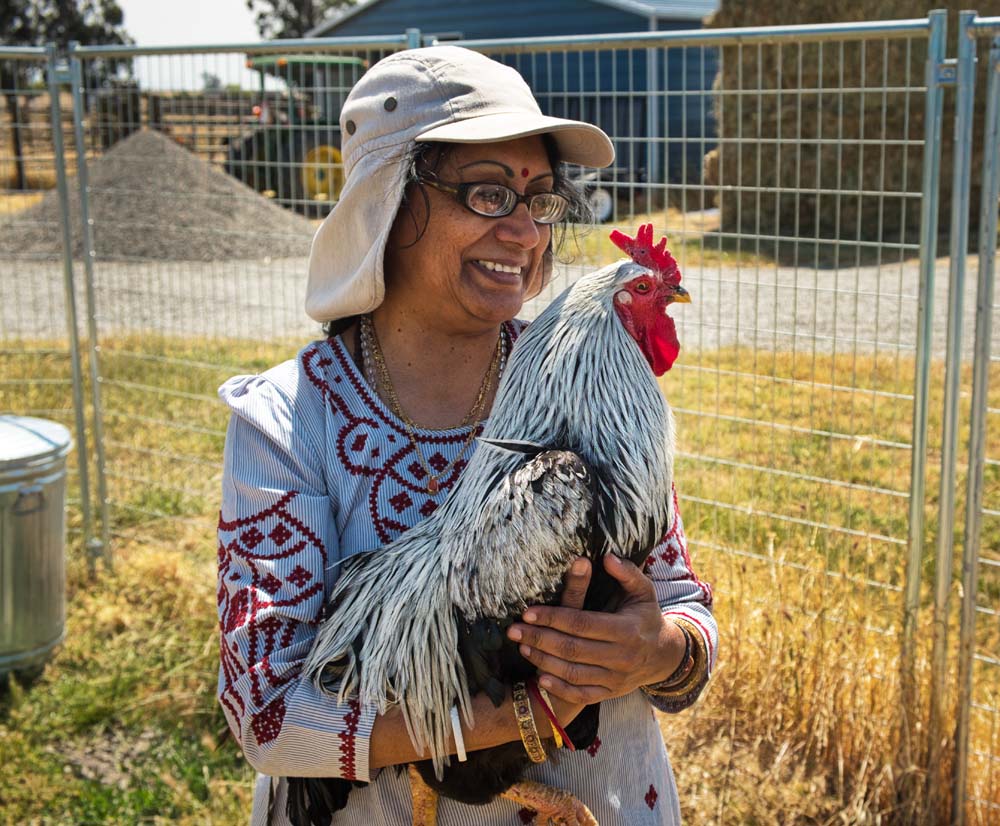
Kevin with Madhulika Singh, PREETIRANG SANCTUARY
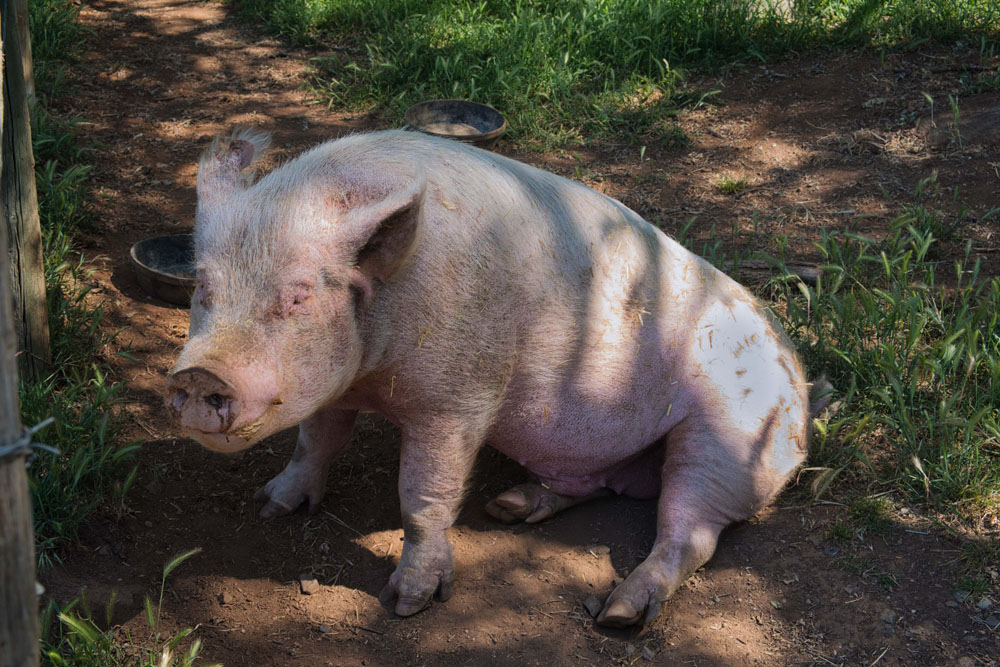
Wilbur, ANIMAL PLACE
Each of us is strongly influenced by our upbringing and family customs. My advocacy is therefore never about being judgmental. It’s about recognizing that we’re each on an individual life-long path of learning, and growing into alignment with our values. Growing up in a family that consumed animals and animal products, I never gave thought to the animal whose body part lay on my plate. This disconnect (aptly called “self-anesthetization” by author Jim Mason) is not our fault; we did not choose to deliberately inflict malice upon another being. How many meat consumers would be willing to personally kill the animal they were going to eat? However far removed we are from the cruelty, the truth remains that there is no larger loss of life taking place on this planet today than the killing of animals in factory farms. There is a strong pull within human nature, to accept the status quo – long-standing traditions that provide a sense of cultural acceptance and even social validation. The idea that, “If everyone is doing it, it must be right!” The animal agriculture industry only reinforces our collective numbness, as factory farms are largely invisible to us, our awareness kept removed from the billions and billions of animals slaughtered with mass indifference, every second of every day.
Sadly, this is one of the greatest cognitive dissonances of our time, that most people say “I love animals,” yet continue to support industries where animals are exploited as objects and units of production. We’ve allowed a division in our perception, that we can love our companion animals and at the same time leave others to a gruesome, violent fate we would never wish upon another. The potential for humankind to move towards greater peace and harmony will grow only when we honestly face the inconsistencies with which we treat others. We know how relevant this is, especially during these times, to human rights and equality, but it is goes far beyond this. Bringing harm to non-human animals is a self-inflicted wound, for systematized industrial cruelty reinforces, even if subconsciously, a tacit acceptance of force and violence used against others. And what we do to innocent beings only comes to bear upon ourselves; the dire threat of the COVID-19 pandemic is a warning shot that we must move away from exploitation of animals. Over 70% of emerging infectious diseases can be traced to animals.
Can we as a society be brave enough to bring about an evolution in which we see all animals as the beautiful kindred spirits that they are? We need not look further than how we cherish our own pets, to show us the innate empathy we are capable of extending to other beings. Our fellow animals are not beneath us – gazing into an animal’s eyes, we must never cease to be awed as we recognize the same life energy that we hold so preciously within ourselves. We share all the behaviors and intentions that define what it means to be sentient. Desiring to live free from pain, having adequate nourishment and shelter, communicating and socializing in our unique ways, protecting our young, and if necessary, fighting for our lives. We Animals all seek companionship, love one another, play, solve problems, feel joy, fear and sadness, and we mourn.
Around the globe, awareness is growing that we must treasure and protect these animals; currently there are over 200 farm animal sanctuaries in the United States alone! https://vegannavigator.com/farm-sanctuaries/ Visiting a sanctuary for the first time can inspire the awakening that animals raised for food are not an unfeeling, unintelligent mass of “things” meant for consumption; they are above all individuals, with unique emotions and personalities.
Providing a forever home for these animals is only a drop in the bucket compared to the countless animals who are killed every year, yet these sanctuaries are so much more. They give us an opportunity to connect with our non-human friends, and educate and inspire us to lead more compassionate lives.
Needless to say, I have been moved during my interactions with animals in sanctuaries over the years. The thing that has touched me the most is the feeling that they have a sense of natural mindfulness, centered in the moment. Fully embracing the idea of “just being,” (something we humans can learn!) with an infectious energy of spirit. And it’s not surprising that these animals continually touch the hearts of sanctuary staff members and volunteers. The passing of Wilbur the pig, a long-time resident of Animal Place in California, saw an outpouring of love, as described by volunteer Alida Labia:
“The first time I met Wilbur I fell in love and have had the good fortune to spend a lot of time with this charismatic pig. My bond with him deepened over the last few months when Animal Care entrusted me to give him the royal treatment. I would arrive on my visits with roasted butternut, sweet potatoes and strawberries, all organic of course! He had a marvelously expressive face and a wonderful assortment of grunts and we would have some good conversations. He was extremely observant and he would make me laugh with his mischievous sidelong glances. A week before he died I lay down in front of him and his eyes held a tenderness and tiredness I had never seen before. I felt so lucky to just be with him. He was loved by so many and lovingly taken care of at his wonderful Animal Place home. He will always be a big part of my life and I am feeling his loss deeply. At his funeral I was crying and Brenda hugged me and said: “he really was your best friend” and those true words will forever be etched in my mind.”
As the name of this website attests, vegans can make a difference. Individual acts of compassion have the collective power to elevate our consciousness and create positive change. Refusing to exploit animals and becoming vegan is not about being righteous or superior. It’s simply about extending our circle of kindness and lessening the suffering of others, and opening our hearts to the innate compassion that resides within us for all other living beings.
The following contributing writers share personal stories of the kindred animals who have touched their lives:
EMMA
By NANCY CORREA
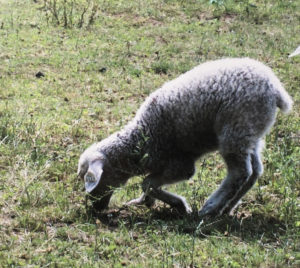
The first time I saw Emma she was hobbling beside her mother, the only lamb visible. Ewes were running desperately from one side of the pasture to the other, a wild look of desperation in their eyes looking for their babies. They had already been taken to the abattoir, Emma was next. I asked if I could take Emma as well as her mother. They stated that I could take her but her mother was still being “bred.” There was another ewe though who had mastitis and was slated to also go on the next transport. She was 2 years old. My friend and I and I quickly found a private sanctuary that would take both of them. It was time for Emma to say goodbye to her mother. I looked into her mother’s sad eyes and told her I would take care of her baby. One last nuzzle before Emma left. We never saw her mother again.
Emma was born with shortened tendons so there were many vet visits. She had to wear bandages on her legs for many months. When she returned home from the vet she was greeted by her entire two and four legged family including her beloved canine sister Harley Ann. The chickens ran up to her and the peacocks screeched to her in greeting. Emma and Ivy quickly settled into a mother-daughter relationship. She was the only baby Ivy was allowed to raise. All her other little ones had been taken away yearly.
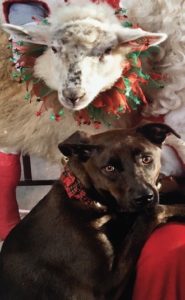 Emma and Harley Ann
Emma and Harley Ann
After many blissful years, Ivy passed away with all those she loved and who loved her at her side. A rarity for lambs ewes and rams. Emma cried out when she saw the body of the only mother she had ever known. The llamas quickly came to protect her, they became her surrogate mother.

Emma died recently after a happy life filled with love. Her expression in death was one of peace. Perhaps I’m being fanciful but Emma in the quiescence of death appeared to be gazing at vast vistas, a slight smile on her face.
Don’t be fooled by the bucolic pastoral scenes, the promise of humane, organic. These industries are based on the kidnapping and murder of the most helpless. Male babies are killed instantly or sent to the slaughterhouse. Ewes are constantly impregnated, their babies stolen in a cycle of despair.
A TALE OF TWO CALVES,
By NANCY CORREA
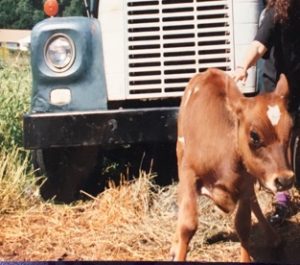
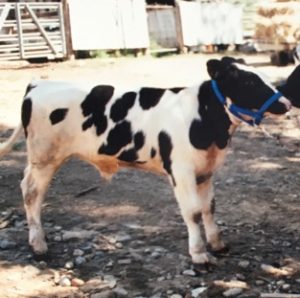
Ragweed and Milkweed
Touted as “humane veal” by the cow’s milk industry these babies were tied to a truck. Their mothers could see them but not get near them. There was no shelter provided. This would’ve been their lives for the three months they would be allowed to live while becoming progressively anemic. The only time they would be allowed to walk- hobble would be to the slaughterhouse.
We spoke to the farmer finally convincing him to give them to us. He also agreed to stop raising calves that would eventually be killed for their anemic flesh. We brought both calves to their mothers one last time to say goodbye before taking them to a sanctuary.
Watching them gambol and stretch their legs for the first time is a memorable moment in my life. They grew into large gentle beings who would run over to me and lick my face then dash around the pasture in utter joy.
They were inseparable-Ragweed died only two weeks after Milkweed. They both lived long idyllic lives, contrary to the untold number of calves murdered by the animal milk industry because they are male.
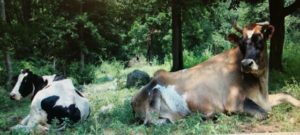
EULOGY FOR IVY, By NANCY CORREA
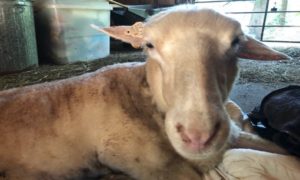
Ivy along with baby Emma were rescued from a holistic vet who has a sheep farm. We had wanted to bring Emma’s Mom with us, but he wouldn’t let her go because she was still being used for breeding. He offered Ivy who was scheduled to be killed within the week because she had mastitis. She was two years old. Ivy was very shy and would never let me take her picture but I still recall her wonder at the private sanctuary that would be her home.
After many years, I found out that Ivy was very ill, after exhausting all possibilities, the time had come to release this brave soul from her suffering. When I approached, she tried to back away. I let her sniff my fingers and I saw recognition dawn in her eyes. When she heard the veterinarians approach she snuggled as close to me as possible. I whispered to her that she would be free of pain, that she would once again romp with her canine sister Harley Ann, she would be with her stolen babies. She lifted her head and looked into my eyes as the veterinarians made their preparations.
Ivy died surrounded by those who loved her and whom she loved, including her adopted daughter Emma, the only baby she was ever allowed to raise.
Ivy died looking into my eyes with the same stoicism she had lived her life. I glimpsed dimming reflections of a society that considered her property, a breeding machine, stole her neonates, denied her creaturehood. She infinitely enriched my life in infinite ways. I am honored to have known her, honored that she trusted me.
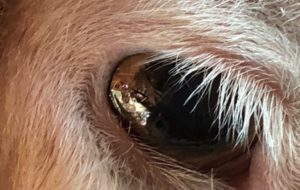
When we rescued Ivy, we were told it was against the law in Connecticut for “livestock” ear tags to be removed. After her death, we removed the ear tags, the symbol of her status as property.
She is free.
